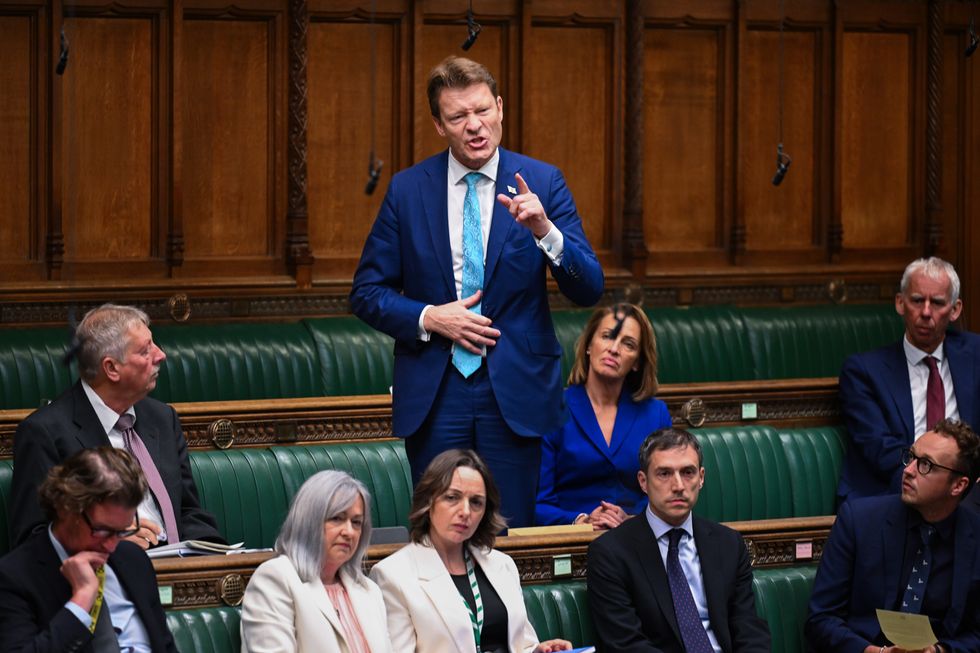EXPOSED: EU to impose sweeping new regulation on the WHOLE of Britain in just 24 hours

WATCH: Olly Harrison discusses EU food standards
|GB NEWS

The first phase of a three-pronged series of new rules will come into force from July 1
Don't Miss
Most Read
Trending on GB News
The EU is set to impose new regulation across Britain in a matter of hours.
The first phase of a three-pronged series of food labelling rules will come into force from July 1 - giving ministers the power to enforce EU regulations across the whole of the UK.
Through a Statutory Instrument, the "Marking of Retail Goods Regulations", goods moving from Great Britain to Northern Ireland must be labelled "Not for EU".
A more limited form of this EU Regulation has been in place since 2023 in Northern Ireland, but from Tuesday it will expand in scope to include far more products.

The EU is set to impose a new regulation across Britain in a matter of hours
|PA
A series of everyday food items can be legally required to carry a "Not for EU" label - not just in Northern Ireland, but across the whole of Great Britain - if just one UK minister says so.
These could include:
- Pre-packed fruit and vegetables;
- Apples, beans, bagged herbs;
- Fish and seafood - cod, salmon, scampi, tuna, crab sticks;
- Dairy-based desserts - trifles, sundaes, ice cream;
- Meaty meals - lasagne, pork pies, scotch eggs, pizzas;
- Everyday sauces - pasta sauces, guacamole, gravy;
- Chilled drinks - iced lattes, milkshakes;
- Meal kits and baby food - anything containing cheese or dairy;
- 'High-risk' foods - rice, peanuts or tea.
As campaigners at Facts4EU have warned, "this is how a sovereign nation dies - not with a bang, but with an EU label".

'If enforcing foreign laws inside Britain, by British hands, isn't a constitutional outrage, then what on Earth was Brexit for?' Jim Allister asked
|PA
According to the official explanatory memorandum, the Government believes the labelling powers are needed to deter GB businesses from withdrawing products from the Northern Ireland market in response to expanded EU labelling requirements from July 1.
By enabling a swift, GB-wide enforcement mechanism, ministers aim to ensure products remain available in Northern Ireland, upholding the UK's commitments under the Windsor Framework.
The Government argues this power provides a "credible threat of enforcement" to prevent disruption to supply chains to Northern Ireland.
If ministers believe Britain-based suppliers will cease supplying the Northern Irish market, they could add the product codes involved to a "watchlist" - affecting all GB firms making those products.
Manufacturers could, as a result, be forced to switch their packaging to read "Not for EU" for compliance purposes.
"If enforcing foreign laws inside Britain, by British hands, isn't a constitutional outrage, then what on Earth was Brexit for?" asked TUV leader Jim Allister.
GBN MEMBERSHIP STORIES ON BREXIT - READ MORE:

'This Government is too often willing to compromise British sovereignty to appease foreign interests,' Richard Tice fumed
| HOUSE OF COMMONSWhile Reform UK deputy leader Richard Tice blasted: "We left the EU to restore our sovereignty and forge competitive trade deals on our own terms.
"Unfortunately, the EU deal showed that this Government is too often willing to compromise British sovereignty to appease foreign interests."
Under the new regulations, if a manufacturer places a regulated product on the British market, they must apply a "Not for EU" label - even if they also export that same product to EU or global markets.
There is no exemption for exporters, no special provision for dual-use packaging, and no flexibility for world trade. This could force firms to run two separate packaging lines:
- One marked "Not for EU" for UK domestic sales;
- One without, for EU and international markets.
Many producers, especially SMEs on the edge of the "small company" exemption, could face a hike in costs as a result.
Now, Facts4EU is leading the Stand for Our Sovereignty campaign in a bid to stop Britain being smuggled back into the EU.
More From GB News










